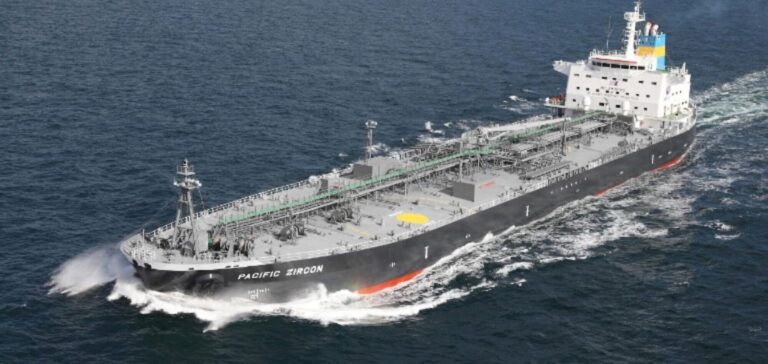A ship carrying a cargo of diesel, owned by an Israeli businessman, was targeted by a projectile off the coast of Oman, without causing any casualties, an attack attributed by Israel and Washington to Iran.
The tanker Pacific Zircon “was hit by a projectile about 150 miles (241 kilometers) off the coast of Oman at around 3:30 p.m. on November 15,” the carrier Eastern Pacific Shipping said in a statement, without giving further details on the circumstances of the incident.
The Singapore-based company is owned by Israeli billionaire Idan Ofer, one of two sons of transportation magnate Sammy Ofer, who died in 2011.
An Israeli official told AFP that the attack was carried out by “drones” similar to “those that the Iranians sell to Russia for use in Ukraine.”
“This is an Iranian provocation,” he said on condition of anonymity, saying the incident was intended to “disrupt” the World Cup, which begins Sunday in Qatar.
This is not an “Iranian victory” over Israel, he added.
“We are convinced that Iran likely carried out this attack using a drone,” said White House National Security Advisor Jake Sullivan. Washington promised to work with its allies “to hold Iran accountable.
No crew members were injured and there was no fuel leakage into the sea, with “minor damage” to the ship’s hull, Eastern Pacific Shipping said.
According to Samir Madani, co-founder of the website TankerTrackers.com, which specializes in maritime transport, the tanker was carrying 42,000 metric tons of diesel fuel, destined for Buenos Aires.
The US 5th Fleet, based in Bahrain, told AFP that it was “aware of the incident”.
The United States and several Gulf countries regularly denounce Tehran’s actions in this particularly strategic maritime zone, which is an almost exclusive shipping lane for connecting the Gulf oil countries to world markets.
In July 2021, the U.S. military pointed the finger of blame at the Islamic Republic for the attack on the MT Mercer Street, an oil tanker run by a company owned by an Israeli billionaire, which killed two people.
Tehran had firmly denied having any link with the attack.
Increased risks
Iran and Western countries are engaged in talks to revive the landmark 2015 deal, which aimed to curb Iran’s nuclear program in exchange for sanctions relief, but negotiations have stalled.
“The risk of attacks on carriers and energy infrastructure in the region has increased due to the lack of progress in the U.S.-Iranian negotiations on the nuclear issue and Washington’s decision to impose new sanctions on Iran,” Torbjorn
Soltvedt, of risk intelligence firm Verisk Maplecroft.
The Islamic Republic rejected on Wednesday a draft resolution presented the day before by the United States and three European countries to the International Atomic Energy Agency (IAEA), denouncing the lack of cooperation of Tehran in the nuclear file.
According to Torbjorn Soltvedt, Tehran could also be seeking to destabilize the region as a “diversionary tactic” to divert attention from the protests that have been shaking the country for the past two months.
Iran has been the scene of protests since the death two months ago of Mahsa Amini, a 22-year-old Kurdish woman arrested for violating the strict dress code that requires women to wear the Islamic veil in public.
The authorities denounced “riots” and hundreds of people were arrested. Since Sunday, five people charged in connection with the riots have been sentenced to death, according to the courts.






















